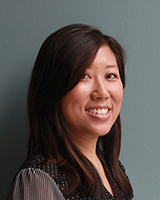Carmen Leung, PhD

Medical Editor
Klick Health
e. carmen.leung73@gmail.com
https://ca.linkedin.com/in/carmenleung73
Interview:
Q: Tell us a bit about your graduate research. What were your most exciting findings?
I was in the Collaborative Developmental Biology Program and my research was focused on congenital heart defects. I used various transgenic mouse models to study a specific population of cardiac progenitors called the second heart field. The second heart field contributes to development of a large part of the heart. My research showed that the gene Rac1 is critical in the second heart field for proper cardiac development. The most exciting finding or moment for me in grad school was when I looked at the first histological section of an embryonic heart in my mouse model found evidence of major congenital heart defects!
Q: What skills did you acquire in graduate school that help you in your current position? How did your degree give you an advantage in attaining your position?
Being able to understand and apply high-level scientific information and attention to detail are skills that I acquired in grad school that help me in my current position as a Medical Editor. My PhD gave me an advantage when applying to my current position because I was seen as someone who had highly developed critical thinking and problem solving skills. As well, my experience being a teaching assistant for pharmacology courses was seen as a great background in the pharmaceutical industry.
Q: Did you know when you entered graduate school that you would most likely pursue a career outside academia?
When I first entered grad school, I thought that I would pursue the traditional route of doing a post-doc and then securing an academic position. However, I realized that there were many other exciting opportunities outside of academia as I was going through grad school, which led me to look more into different careers outside of academia.
Q: What is your favorite part of your job?
The favorite part of my current job is that everyday is different and I get to work on exciting products. Digital health is growing rapidly as more companies begin to realize the huge impact and potential this field has in the future of healthcare. It’s really exciting to be part of this trend and actually get to apply and use my science background and training.
Q: What are some specific examples of extracurricular activities (outside of research) that you participated in, which helped you get to the position you are at now?
Another PhD student, Katherine Lee, and I started the Western chapter of the Graduate Management Consulting Association (GMCA). Being part of the GMCA was a great learning experience and it was through this association that I learned really useful networking tips, resume building skills and formed meaningful connections and networks with people outside of academia.
Q: How did you learn about the posting for your current job?
I knew about the company through another Western alumni who was already working at the company. I heard great things about the company so I kept an eye out for openings and applied when the time was right.
Q: What are some suggestions for networking?
Don’t be afraid to step outside of your comfort zone when it comes to networking, especially if you’re a grad student or post-doc interested in a career outside of academia. Attend events and meet people who are doing something you have an interest in – even if those events are outside of the city. You never know where one connection could lead. From my experience, past alumni have always been happy to have a 20 or 30-minute phone call or coffee with you to discuss their experiences and how they got to where they are now. Take advantage of your alumni network!
Q: What is one piece of advice you can offer to current graduate students? To current post-doctoral fellows?
Make the most of your grad school experience! Get involved with sports, clubs or whatever else you’re interested in. You will find that these extra things you do outside of the lab are what makes grad school an enriching experience. Experiments and papers are important but shouldn’t be the only part of your experience.
Q: What does your perfect Sunday look like?
My perfect Sunday involves a big brunch, time with family and/or friends, a bike ride or hike on a scenic trail or anything outdoors, and some time to read a book or catch up on the news. If I can fit all of those things on a Sunday, then that would be a perfect day!








